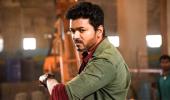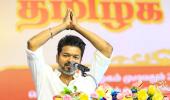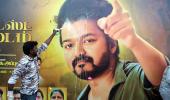As Thalapathy Vijay embarks on a career in politics, Arjun Menon looks at his glorious filmography.

Two muscular hands lifting dumbbells come into focus in the first shot from S A Chandrasekhar's directorial, Naalaiya Theerpu (1992). It's a film where he cast his then 18-year-old son as the hero.
We get an extended workout routine featuring a yet-unrevealed hero with the opening credits.
There is a sense of déjà vu in the way the film frames its young hero, who, despite his lean and boyish appearance, holds a rebellious streak as well as a sensitive demeanour.
The young hero in question is Vijay who made his acting debut as a wise-beyond-years son out to avenge his largely absent, abusive, father, ironically in a project produced, written and directed by his dad.
The part promised to be a tough hang for the young actor with extended dialogue scenes and a stilted performance style did him no favours.

Vijay's film debut (after playing many minor parts as a child artist in many of his father's films) is coincidentally one that encompassed all the traits that we have come to associate with his brand of cinema with the Devil May Care attitude, physical agility and tomboyish charm.
As is often the case with many star kid launches, the first film is expected to be a lightweight romantic drama or coming-of-age story that can officially catapult an unknown face into the sphere of audience familiarity. But here, we get a melodramatic template commercial film that is thrust into the hands of an inexperienced actor.
We get glimpses of the rebellious angst and breezy screen presence often associated with his later-day filmography but the baby-faced Vijay was not up to the task of elevating the already antiquated film-making sensibility at play.

His father cast him as the lead in his subsequent directorial outings too, and that gave the actor a footing as a 'chocolate hero' with three back-to-back romances with Senthoorapandi (1993), Rasigan (1994) and Vishnu (1995).
The actor was quickly gaining traction with the relative commercial success of these films and he rose up the ranks to the title of 'Ilaya Thalapathy' (young commander-in-chief) in the course of this five-film dry run along with titles like Chandralekha (1995) and Coimbatore Mappillai (1995) which were all not traditionally well made mainstream potboilers but kept him engaged.

Vijay, however, had his next big break with the iconic romantic drama Poove Unakkaga (1996), a film that proved to be a game-changer in his still nascent film career.
The star-making turn saw him pair opposite actress Sangeetha on screen, in a familiar story of feuding families and a faithful romance.
It made Vijay a household name, and the film showed a tender, comedic sensibility of his on-screen persona.
But he had an almost dry run for the next few years with decent box office results but no standout films that would make him a major breakout star.
Even in this lowkey run, his father gifted him the much-awaited 'action hero' image with Maanbumigu Maanavan (1997), making most of his dynamic physique and rising matinee idol trappings.

Though the quality of Vijay's output at this juncture was questionable, he found a following in a middle-class audience, who were craving for a star to follow in the footsteps of Rajinikanth and Kamal Haasan, but appealing to the younger demographic with relatable love stories and coming-of-age narratives.
He found himself comfortable within the trappings of the 'next door romantic' hero image with a series of remakes of other language hits like Ninaithen Vandhai (1997) and Kadhalukku Mariyadhai (1997), which kept his growing fanbase happy.
Faasil's remake of his Malayalam original Aniyathipravu (1997) with Kadhalukku Mariyadhai (1997) had a huge impact on his upcoming films with the blockbuster run and iconic status that the film enjoyed in its initial run.

Towards the end of the 1990s, Vijay had developed a formula of sorts for his films by playing tragic lovers, who end up losing his love or sacrificing his love in the film's final moments.
This was a recurring trope in Vijay's career trajectory and a successful one at that as he was slowly morphing his screen image to that of an adequately flexible actor who could accommodate action, pathos, and romantic iconography, into his evolving rooster of the toolkit as a star.
Films like Priyamudan (1997) saw him perfect the formulae to a tee, playing a suave yet manipulative lover, who misappropriated his identity for winning over the love of a woman, only to lead to tragic consequences.

The doomed lover trope was further pushed to the extremes with films like Thulladha Manamum Thullum (1999) which to this day, is revered as one of his finest works by fans and general audiences alike.
This romantic classic about the ultimate sacrifice for love saw him pair opposite Simran for the first time as he played a man hiding his identity and selflessly loving a woman who does not even know what he has done for her in the process.
The film was a sensational box office success.
The soundtrack marked the beginning of a similar song-based market for his films, where the songs broke out as chartbusters even before the release of Vijay films.

Vijay collaborated with debutant directors like Vincent Selva and Ezhil as well as veteran hitmakers like K S Ravikumar for Minsara Kanna (1999) and Faasil for Kannukkul Nilavu (1999), and the mix continued his hot streak towards the beginning of the new millennium.
He continued to star in his father's films like Nenjinile (1999), which kept his success ratio afloat.
His performance in Kannukkul Nilavu, as a man suffering from retrograde amnesia, garnered critical acclaim at the time and shed light on an untapped aspect of his work as an actor.
At times, Vijay challenged preconceived notions of his persona as a screen idol with these minor detours in his filmography where he explored the psychological aspects of his characters in mostly one-note traditional commercial cinema.
But this would be spread out in his work as the unmanageable ascend to stardom in such a short span also meant that he had to indulge in fan service and star-making parts to consolidate his standing in the industry with actors like Ajith, Surya, and Vikram also making ripples felt in the box office game over the subsequent years.

Vijay took his hot streak into the 2000s with films like Kushi (2000), Priyamanavale (2000) and Friends (2001).
These films are iconic benchmarks in his career, when romantic comedies were the order of the day and he could turn in his successful loverboy image.
But this softer, wide-eyed, young man Vijay aesthetic would soon be consumed by the advent of the updated version of the 'masala' subgenre of Tamil cinema, earlier adopted by the likes of Rajinikanth and Vijaykanth, with successful results.
Vijay balanced romance with a sprinkling of action beats with films like Bagavathi (2002), Vaseegara (2002) and Thirumalai (2003) but one film changed all that: Ghilli (2004).
The sports drama was about a student kabbadi player, who bites off more than he can chew, when he rescues a woman from the hands of an influential gangster, only to disturb his seemingly routine existence.
The film is the starting point of the Vijay mythology as we know it today, as we can clearly demarcate his career as a 'Pre-Ghilli' and 'Post-Ghilli' phenomenon. Such is the impact the film had on his body of work and Tamil cinema in general.
The film perfectly calibrated his charm and larger-than-life persona within the confines of a rewarding sports drama story.
The 'massy' approach caught Vijay at the right time of his career and started his box office rampage with superhits like Thirupaachi (2004) and Sivakasi (2005).

Prabhu Deva's Pokkiri (2007) was the next major career highlight for Vijay as it doubled his newfound superstardom.
The film sealed the deal for Vijay and his dedicated fan following took roots with the iconic lines, massy demeanour and stylish action sequences, all making him the biggest of the young stars in Tamil cinema.

Vijay had a bit of a career slump for the next few years with films like Azhagiya Tamil Magan (2007), Kuruvi (2008), Villu (2009), Sura (2010) and Velayudham (2011) all underperforming and garnering poor reviews.
He did have short burst-out hits with Kaavalan (2011) and Nanban (2012), both remakes directed by legendary directors like Siddique and Shankar.
Thuppakki (2012), directed by A R Muragadoss (their first blockbuster collaboration), got Vijay out of the rut of the box office slumber into a fan favourite position again.
Their next collaboration in Kaththi (2014) pushed the envelope of the social issues that can be addressed in a crowd-pleasing mass film and by this point, Vijay had made his way back on top, reigning his supremacy as a box office icon.

Vijay also thrust his confidence on the back of Atlee, a one film old film-maker at the time, with Theri (2016), a straightforward cop revenge drama that secured a good run.
It led to two more collaborations, Mersel (2017) and Bigil (2019). The three films also tested Vijay's ability to play multiple characters simultaneously as Atlee developed a narrative of using Vijay in two or three role parts in a single film.
This made things interesting for fans, who got to relish the newfound versatility in Vijay's on-screen persona.
Vijay encouraged collaboration with the younger crop of film-makers like Lokesh Kanagaraj for Master (2021). He entered a phase in his career where his salary skyrocketed in keeping with his 'Pan Indian' salability as a star.
Only a few stars in the history of Indian cinema have been able to rake in the kind of pay cheques and back-end deals that Vijay has been able to get for his later films.
Master saw his larger-than-life persona being channeled in the right ways by Lokesh Kanagaraj, who made him a college professor who takes it upon himself to straighten out a child trafficking gang.

Vijay reached a point in his filmography where his mere silhouettes or just the mention of his name can send fans into a tizzy.
This kind of unparalleled stardom also comes with its demerits as fans can easily be restrictive in their appreciation of him trying something more contained and family-centric with his persona.
For instance, Vijay got a lot of flak for being part of an experimental Die Hard rip-off like Beast (2022) with director Nelson.
The star felt out of place in Nelson's self-contained, deeply structured story world.
He also got discouraged in going the Telugu cinema template way in Varisu (2022), as he was let down by poor writing.

Lokesh Kanagaraj seems to know how to tackle Vijay's stardom head-on and not bend under unfair expectations and pre-release hype that a Vijay starrer entails.
In Leo (2023), Kanagaraj finds interesting ways to use Vijay's stardom to the film's advantage.
He gives Vijay some character beats to work with, a facet gravely underutilised in the actor's recent films. But the tonal imbalance and generic tendencies prevented it from being what it could have been. Still, no recent film has gotten so close to the raw, innate charm of Vijay, the actor.

GOAT is Vijay's latest film after he announced his entry into politics with his newly formed party, the Tamilaga Vettri Kazhagam. He will now contest the 2026 Tamil Nadu assembly elections after which he will quit acting.
This news comes as a shock to many, but his fascination with a life in public service and mainstream politics has been no secret to film goers and the general public alike.
GOAT is a fan service vehicle struggling to get out of the spy thriller origins of its screenplay.
Venkat Prabhu, who was put in the uncomfortable position of helming Vijay's penultimate feature film, had too many targets to hit and missed..
But there is promise for one more film before Vijay bids us farewell and one hopes that it will live up to the towering legacy of one of the country's biggest superstars.












 © 2025
© 2025